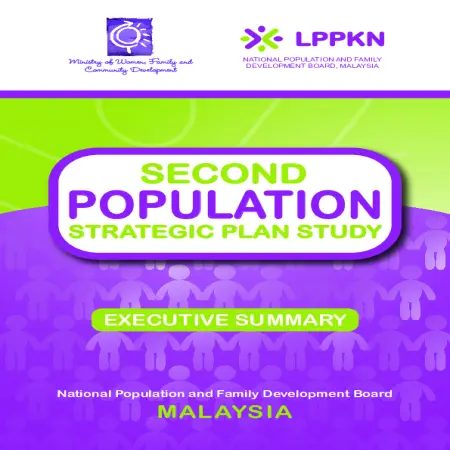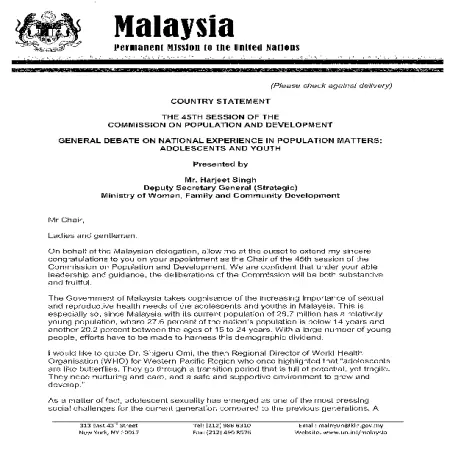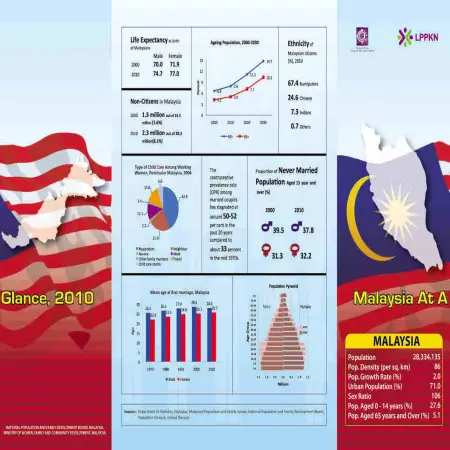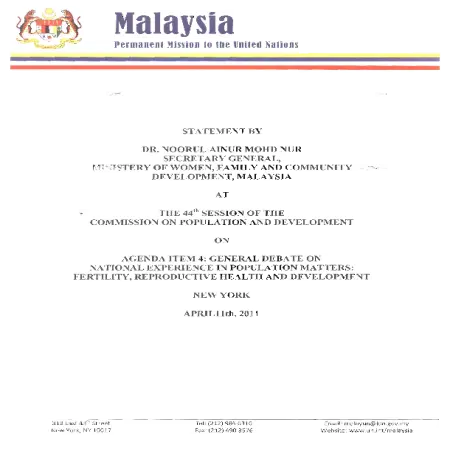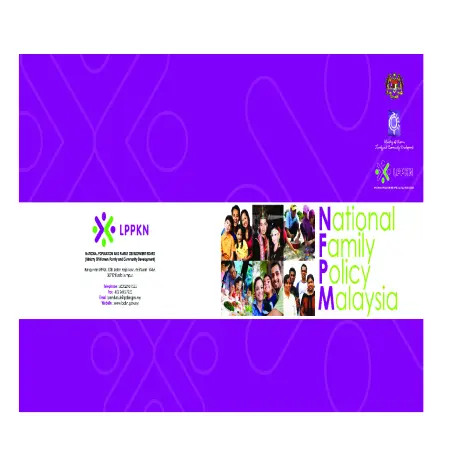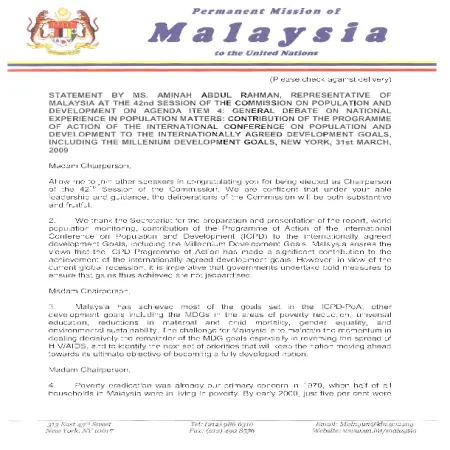Browse by Author
Results for Family Name : "National Population and Family Development Board, Malaysia"
|
|
Second Population Strategic Plan Study : Executive Summary
Item Type: Book
Editor:
Year: 00/09/2012
Abstract: The Second Population Strategic Plan Study was conducted from July 2008 – December 2009 by the Ministry of Women, Family and Community Development through the National Population and Family Development Board. This study is a follow-up to the 1st Population Strategic Plan Study conducted in 1992. The objectives of the Second Population Strategic Plan Study are to assess and evaluate the implementation of the national population programme in the context of current policies; and to recommend a strategic plan of action framework for the implementation of future population and development programmes.
|
|
|
|
|
|
The 45th session of the Commission on Population and Development at the general debate on national experience in population matters: adolescents and youth, New York, 24th April, 2012
Item Type: Country Statement
Editor:
Year: 00/04/2012
Abstract: The Government of Malaysia takes cognisance of the increasing importance of sexual and reproductive health needs of the adolescents and youths in Malaysia. Since Malaysia with its current population of 28.7 million has a relatively young population, where 27.6 percent of the nation's population is below 14 years and
another 20.2 percent between the ages of 15 to 24 years. With a large number of young people, efforts have to be made to harness this demographic dividend.
|
|
|
|
|
|
The 44th session of the Commission on Population and Development on agenda item 4: general debate on national experience in population matters: fertility, reproductive health and development, 11th April, 2011
Item Type: Country Statement
Editor:
Year: 11/04/2011
Abstract: Fertility among Malaysian women is declining faster than expected due to the increase in the average age at first marriage for women that has risen from 24.7 years in 1991 to 25.3 in 2004. Malaysia's total fertility rate (TFR) is expected to reach the replacement level by year 2015. With more and more women participating in the labour force and prioritising career development, this has also led to many highly educated women choosing to marry late or not to marry at all.
Malaysia hopes to sustain the current fertility rate and not let it fall below replacement level. Sustaining the current TFR of 2.3 is one of the major challenges that has to be monitored as it can lead to contraction of labour supply, rapid aging of the population and other social implications.
|
|
|
|
|
|
National Family Policy
Item Type: Act & Policy
Editor:
Year: 00/03/2011
Abstract: Malaysia is one of the few countries that has an explicit policy on family. The National Family Policy (NFP) was launched on 19 March 2011. It advocates the concept of family wellbeing based on family values such as caring, honesty, justice and equity regardless of status, gender and age. At the macro level, the policy will be the catalyst to urge all stakeholders to take into account the family perspective in all their planning, strategy formulation or development efforts, either through their commitment, formulation or review of policies and laws that are not family friendly to ensure that programmes, services and family friendly facilities are accessible.
|
|
|
|
|
|
The 4th East Asia Ministerial Forum on Families, "safe and resilient families: protecting and empowering at-risk and high risk families", Kuala Lumpur, 7-10 November 2010
Item Type: Country Statement
Editor:
Year: 00/11/2010
Abstract: A family is a living, evolving institution, affected by socio-economic factors as well as by the changes that shape the social environment in which it functions. More often, the changes and transformations have brought both gains and losses to family institutions. Hence, the challenge today is to reinforce positive changes and secure those in the new environment, and at the same time, to mitigate the negative consequences of changes, without dampening the momentum for positive evolution.
|
|
|
|
|
|
Parenting@Work module
Item Type: Module
Editor:
Year: 00/00/2010
Abstract: The National Population and Family Development Board (NPFDB) has developed a Parenting@Work courses designed to help dual career families cope with the multiple demands of work and family life. Through the Parenting@Work courses, you will have the opportunity to learn the skills and techniques of balancing family and work, time management as well as gain valuable parenting knowledge and skills to make you a better parent. You are urged to utilize the opportunity provided by NPFDB to enhance your knowledge and skills in facing contemporary family challenges.
|
|
|
|
|
|
Malaysia country report at 4th East Asia Ministerial Forum on Families, "Safe and resilient families: protecting and empowering at-risk and high risk families", Kuala Lumpur, 7-10 November 2010
Item Type: Country Statement
Editor:
Year: 00/00/2010
Abstract: Malaysia recognizes the family as a natural and fundamental
social unit that provides valuable human resource and forms the
backbone for solidarity, security and nation building. Malaysia
believes in the importance of family development in line with the
objective of creating a caring society ; Family is PRIORITY NO. 1
|
|
|
|
|
|
A Study on health status of youth in Malaysia
Item Type: Research Report
Editor:
Year: 00/00/2010
Abstract: This study analyzed health screening of 22,840 youths, who were distributed equally by ethnicity and camp sessions. Based on the analysis, 21.6% of youths were underweight, 18.1% pre-obese and 10.3% obese, with 0.3% perceived having body image disorders. With regards to sexual and reproductive health issues, 39.6% admitted viewing pornographic materials, 28.5% practiced masturbation, 6.5% engaged in premarital sexual relationships, 5.5% had multiple partners and 1.6% had been involved in homosexual relationships. History of abortion was discovered by 0.5% of the respondents. Almost a quarter of the youths were smokers, while 8.7% had consumed alcohol and 1.4% admitted taking drugs. The study also revealed that 6.2% of respondents reported to have past involvement in bully and 14.1% in fight. About 7.1% of the respondents revealed they had been physically abused while 1.2% of them had been sexually abused. Mental health problems were noted in 27.5% of the youths, with depression in 9.8% of the youths, anxiety in 20.7% and suicidal ideation in 11.8%. Psycho-social problems such as substance use, antisocial behavior, physical/sexual abuse and mental health problems among youth are interrelated with common risk and protective factors. Management of psycho-social problems in youths should be holistic; looking into risk and protective factors. Programs and interventions should focus on strengthening of protective factors among youth such as family connectedness and religiosity.
|
|
|
|
|
|
The 42nd session of the Commission on Population and Development on agenda item 4: general debate on national experience in population matters: contribution of the programme of action of the international conference on population and development to the internationally agreed development goals, including the millenium development goals, New York, 31st March, 2009
Item Type: Country Statement
Editor:
Year: 31/03/2009
Abstract: Malaysia has achieved most of the goals set in the ICPO-PoA, other
development goals including the MDGs in the areas of poverty reduction, universal education, reductions in maternal and child mortality, gender equality, and
environmental sustainability. The challenge for Malaysia is to maintain the momentum in
dealing decisively the remainder of the MOG goals especially in reversing the spread of
HIV/AIDS, and to identify the next set of priorities that will keep the nation moving ahead towards its ultimate objective of becoming a fully developed nation.
|
|
|
|





